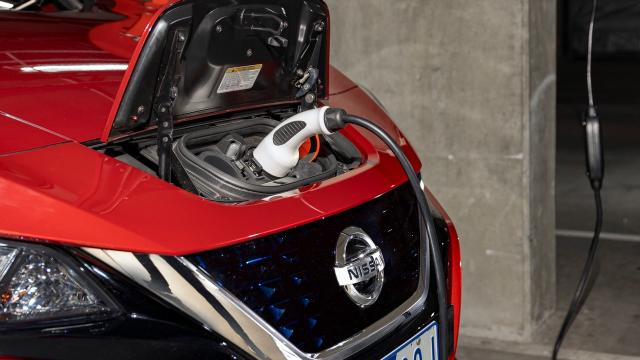There are currently zero federal incentives to encourage Electric Vehicle (EV) uptake in Australia. They’re also quite expensive compared to traditional cars. And yet the Victorian government now wants to tax EV drivers.
The Victorian government wants to tax EVs
On Wednesday Victorian Treasurer Tim Pallas proposed introducing a tax for zero and low emission vehicles like EVs and hybirds.
According to The Age, the proposed tax would charge EV drivers 2.5 cents for every kilometre they drove. Hybrid drivers would be charged 2 cents.
According to Pallas this would make it “fairer” for all Australian drivers who are charged through taxes placed on petrol pumps.
“When you consider that people who drive internal combustion engines, either petrol or diesel, those people are paying every day fuel excise,” Pallas said,
“If you’re not filling your vehicle up with petrol, then ultimately you’re not paying your share of maintenance costs of dealing with our road system, so this is essentially the government making it a fairer system that so that everybody pays their fair share of that wear and tear.”
[related_content first=”1168794″]
Pallas expects the tax to raise and raise $30 million. While this money will not be put back into EV infrastructure, the Treasurer said that next week’s budget will allocated $45 million for policies to boost uptake of low-emission vehicles.
He went on to justify the tax by pointing to alleged exponential growth of EVs over the coming years. Pallas said he believes there will be price parity between EVs and traditional fuel-powered cars by 2025.
This is interesting because at the present time the cheapest new EV in Australia is MG Motor’s ZS SUV. As of November 2020 it had a drive away cost of $43,990.
Comparatively, the cheapest new petrol-engine cars in Australia start at around $16,000.
[related_content first=”1204250″]
Pallas also said that modelling from the federal government suggests that by 2030 around 26 per cent of cars in Australia will be EVs.
In 2020, EVs are said to have only made up 0.2 per cent of vehicles in Australia.
That’s going to be quite the alleged jump in 9 years, particularly when Australia has very little support for EV uptake.
The proposed bill will reach the upper house in May.
Backlash over the tax
Unsurprisingly, not everyone was on board with the proposed tax.
“Today Vic Labor Govt will introduce a Bill to put extra tax on drivers of electric cars. We’re pretty much only place in world that’s doing this,” Victorian Greens Deputy, Ellen Sandell, said on Twitter.
“It’s a silly idea & we Greens are working w industry lobbying Labor to dump the tax & introduce incentives for EVs instead.”
Today Vic Labor Govt will introduce a Bill to put extra tax on drivers of electric cars. We’re pretty much only place in world that’s doing this. It’s a silly idea & we Greens are working w industry lobbying Labor to dump the tax & introduce incentives for EVs instead #springst
— Ellen Sandell (@ellensandell) March 16, 2021
When asked about her opinion on the rationale behind the move, she said, “They want to get in first to get the tax revenue before the Liberal Fed Gov does. Also maybe fattening up VicRoads for privatisation?”
According to The Age, Animal Justice Party MP Andy Meddick, said the tax sends the wrong message.
Australia suffers from a lack of EV incentives
At a state level, there are a few incentives to encourage EV sales.
In the ACT new EV owners don’t have to pay stamp duty and get a 20 per cent discount on registration.
And as of November 2020 the ACT government is offering zero-interest loans of up top $15,000 to help with the purchasing of EVs.
In Victoria EVs are exempt from regular ‘luxury vehicle’ stamp duty. EV owners pay $8.40 per $200 of the market value of the vehicle, as opposed to up to $18.
Victorians EV drivers also get $100 knocked off their annual registration.
In Queensland both EVs and hybrids pay a reduced stamp duty – $2 per $100 up to $100K and $4 per $100 for anything over $100K.
Comparatively, regular vehicles pay up to $6 per $100 in stamp duty.
However, there are no federal incentives currently in place, which puts Australia years (and in some. cases, decades) behind many other countries throughout the world.
In fact, the Morrison government recently ruled out offering tax subsidies for EVs and hybrid cars.
The closest Australia has at a national level is the more generous Luxury Car Tax threshold (LCT) afforded to fuel efficient vehicles.
In fact, the LCT was even relaxed at the start of the 2021-2021 financial year to only apply to applicable cars, like EVs, if they cost over $77,526.
This means that owners will be taxed $0.33 for every dollar above that threshold.
Comparatively, LCT on petrol engine vehicles is calculated from $68,740.
While this is better than nothing, most EVs in Australia are pricey and will get hit with LCT anyway.
One could argue that perhaps EVs should be exempt from LCT altogether as an incentive for uptake.
